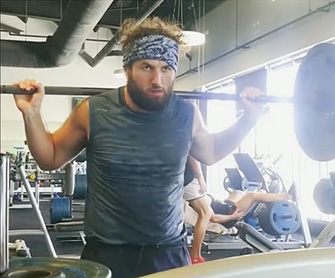
Ben is a personal trainer at PureGym. He helps clients achieve their fitness goals using boxing, strength and conditioning training, as well as nutrition and physical rehabilitation work.
How would you characterise your current work?
I would characterise my work as very personal and intimate. People invest time and money into their own health and goals and trust me to act as a medium to do it through. Because of this I get to know them on a very personal level and bring out a side to them that they probably don’t show to other people in their lives.
How do you feel about maths?
I feel that maths is important in everyday life, especially when it comes to doing everyday tasks like shopping, paying for things and budgeting. I can also see how maths can be used on a more abstract level to break down the workings of the universe, although I’m nowhere near smart enough to understand that type of use of maths.
What is it about your work that is mathematical?
There are certain aspects of my work that can be mathematical. It depends on the trainer themselves, and whether they feel it’s necessary (or want) to be specific in order to achieve the client’s goal. Mathematics can be used to work out calories and macronutrients, body composition, and to progressively overload in strength training (incrementally increase the workload on the body to avoid plateaux). However, it is possible to achieve the client’s goal without using such objective methods.
How do you use maths, calculation or numeracy in your work? What tools do you use to help you?
In my line of work, I often need to calculate weights, reps and sets whilst training a client. This can be done as mental arithmetic. I might also use maths within the training plan itself. I need a good understanding of maths to do things like design nutrition plans, periodisation programming (splitting various aspects of athletic training across a longer timescale) and calculating % of xRM (working out the weight someone can lift and for how many repetitions based on their maximum lift on 1 repetition, i.e. ‘1RM’). For this I usually use my phone calculator, although I could use Microsoft Excel to work out the formulas. Finally, within the actual business of personal training, quite often I need to use maths to calculate my incomings and outgoings. I use a money tracking app for this, which keeps everything clearly organised.
Do you think maths is creative? If so, how?
I’m not sure about maths without context, but I definitely get creative with maths in my work. For instance, when training a client and they can’t complete the reps/sets/weight I have planned (or I want to mix things up), I use maths to modify the set exercise to help them achieve the same outcome. For me, knowing the maths of a given system can give me the creativity and freedom to adjust things within that system.
Do you use or rely on any maths that you learnt in school?
I definitely use more maths from school than I thought I would. From simple arithmetic on the gym floor to working out percentages, having a good understanding of maths has proved essential in my line of work. There is a lot of maths from school that I can’t remember and definitely don’t use. This would be things like working out surface areas or volumes of shapes. If I do need to find out that kind of information, I usually use Google.
How would you change the school curriculum, if you had the chance? Why?
To be honest I can barely remember the curriculum. There definitely could have been more emphasis on real world maths, especially things that can help people manage their everyday activities, such as taxes, tax returns, stock market and so on. That would have been useful to know as an adult. The maths I was taught in school has served me well to this point, but if there is anything I cannot do, I am happy to use technology to help me.
Join the conversation: You can tweet us @CambridgeMaths or comment below.